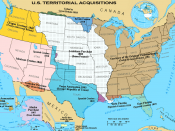During the nineteenth century, America started looking for expansion generated by the increase in population, wealth and industrial production, the United States territory not only expanded westward it gained possession of several distant lands. Thus, creating the United States of today.
"By 1895 an expansion program supported by a small but growing number of American politicians, publicists, navel officers, and businessmen gave a specific direction to expansionist currents and reinforced the appeal of the imperialist idea. This generally included the annexation of Hawaii, the acquisition of one or more base areas in the West Indies and the construction of an Isthmian s Canal across Central America to facilitate navel and mercantile movement between the Eastern United States and the Pacific Ocean. Some also aspired to the peaceable annexation of Canada, while others wished to challenge British political and economic leadership is South America. Virtually all limited their ambitions to the western hemisphere, and most to areas traditionally within the sphere of American interests.
The peace treaty with Spain provided fro American possession of Puerto Rico, the Philippines and Guam. Hawaii had already been separately annexed, and Cuba was subjected to a three-year military occupation followed by a theoretically sovereign independence in 1902. Cuba became a self-governing protectorate of the United States, with the latter nation retaining important governmental control and the right of military intervention at its discretion under the terms of the plat amendment of 1901" (americanforeignrelations). As America was going through this imperialistic growth, events were taking place else ware.
"The most fundamental explanation of the global imperialism of the nineteenth century was that of the Western world, containing a relatively small minority of the worlds people, had achieved a virtual monopoly of effective power. The development of the nation-state enabled the effective mobilization of a society's resources,


